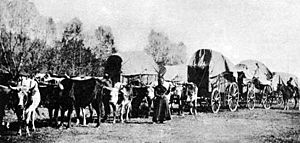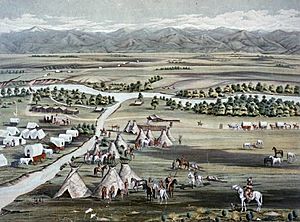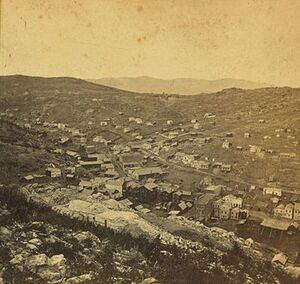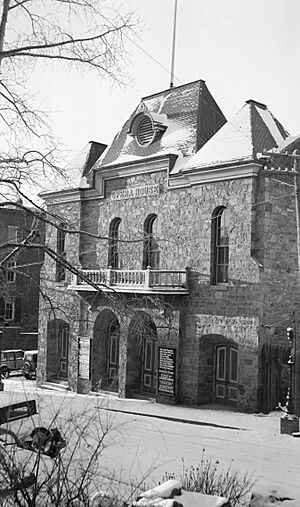Clara Brown facts for kids
Quick facts for kids
Clara Brown
|
|
|---|---|
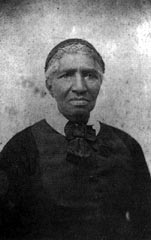 |
|
| Born | January 1, 1800 |
| Died | October 23, 1885 (aged 85) Denver, Colorado
|
| Other names | Aunt Clara Brown |
| Occupation | Cook, laundress, midwife, nursemaid, and real estate investor |
| Known for | Being the first Black settler in Colorado, philanthropist, and abolitionist |
Clara Brown (born January 1, 1800 – died October 23, 1885) was an amazing woman who started her life enslaved in Virginia and Kentucky. She became a respected community leader and a generous helper of others. Clara played a big part in Colorado's Gold Rush, especially by helping other formerly enslaved people find new homes. People called her the 'Angel of the Rockies' because of her kindness. She is remembered as "Colorado's first Black settler and a successful businesswoman."
Clara was born in Virginia in 1800. Her family later moved to Logan County, Kentucky. When she was 18, she married and had four children. Sadly, in 1835, her family was separated when they were sent to different owners. At 56, Clara gained her freedom. However, she had to leave Kentucky. She traveled to Denver, Colorado, working as a cook and laundress on a wagon train.
Clara settled in a mining town now known as Central City, Colorado. There, she worked hard as a laundress, cook, and midwife. She was smart with her money, investing in land and mines in nearby towns. People affectionately called her "Aunt Clara" because she offered so much support. She even helped start a Sunday school in her own home.
After the Civil War ended, Clara could travel freely. She sold her investments to go back to Kentucky and search for her daughter. Although she didn't find her right away, she paid for 16 or more relatives and other formerly enslaved people to move to Colorado. In 1882, she finally reunited with her daughter, Eliza Jane, and her granddaughter.
In 1885, the year she passed away, Clara Brown was honored by the Society of Colorado Pioneers. This was for her important role in Colorado's early history. She was also recognized in the Colorado Women's Hall of Fame in 1989 and the Colorado Business Hall of Fame in 2022. Her inspiring life story was even turned into an opera called Gabriel's Daughter in 2003.
Contents
Clara Brown's Early Life
Clara Brown was born on January 1, 1800, near Fredericksburg, Virginia. She was born into slavery. When she was young, Clara and her mother were sent to work for Ambrose Smith, a tobacco farmer. They worked hard in the fields. At 18, Clara married a man named Richard. They had four children: Richard, Margaret, Paulina Ann, and Eliza Jane. Paulina and Eliza were twins. Sadly, Paulina passed away at age 8.
In 1835, Ambrose Smith, Clara's owner, died. To manage his property, Clara's family was separated. They were sent to different places. A man named George Brown from Kentucky recognized Clara's strength. He made sure she came to work for him.
Finding Freedom and New Beginnings
At 56 years old, Clara Brown finally gained her freedom. This was part of George Brown's will. A law in Kentucky required her to leave the state once she was free.
Journey to Colorado
Clara found work as a cook and maid for a family traveling west. They were heading to Leavenworth in Kansas Territory. In April 1859, Colonel Benjamin Wadsworth hired Clara. She worked as a cook for 26 men on a wagon train. The journey to Denver was long and hard, lasting eight weeks. Clara Brown is thought to be the first African American woman to arrive in Colorado during the Gold Rush.
Building a Life in Colorado
In the Denver area, Clara settled in Auraria. She worked at the City Bakery. She also helped start a Sunday school with two Methodist ministers. Many miners were moving to the mountains. Clara followed them and opened the first laundry in Gilpin County. This area is now called Central City, Colorado. She also worked as a midwife, cook, and nursemaid.
Clara's laundry business grew a lot when she took on a partner. She was smart with her money. She invested her earnings in land and mining claims. In just a few years, she saved $10,000. She owned many properties, including 16 lots in Denver and 7 houses in Central City. She also had land and mines in Boulder, Georgetown, and Idaho Springs.
Clara was very generous to everyone in her community. She hosted the first Methodist church services in her home. She helped anyone in need, including new settlers and Native Americans. People called her "Aunt Clara." Her home was a safe place for those who were sick or poor. She even gave money to help build the Catholic Church and the first Protestant church in the Rocky Mountains.
Frank C. Young, a writer from the Rockies, spoke highly of Clara Brown. He said that everyone in their small community knew "Aunt Clara." He noted that after gaining her freedom, she worked hard. She then joined the gold seekers in Gregory Gulch. Her success allowed her to help her relatives and many others from her community move to Colorado.
Helping Others and Finding Family
Clara had friends who could read and write. They helped her send letters to find her family. She learned that her husband, Richard, and daughter, Margaret, had passed away. Her son, Richard, was also lost. But Clara promised herself she would find her daughter, Eliza Jane. After the Civil War ended, she sold her properties. She used the money to travel back to Gallatin, Kentucky.
She didn't find Eliza Jane there. However, she helped 16 relatives and other formerly enslaved people. She paid for their travel to Colorado by train and wagon train. Once they arrived, she helped them find jobs. In 1879, Clara also went to Kansas. She helped formerly enslaved people start new communities and farms. By the time she was eighty, Clara had used most of her money. She gave a lot to charity, searched for her family, and was unfortunately tricked by some real estate agents.
Clara moved to Denver because the high altitude of Central City became difficult for her. She lived with a friend. After many years of searching, Clara finally heard news about her daughter. Eliza Jane was living in Council Bluffs, Iowa. At 82 years old, Clara traveled there to meet her. A newspaper, the Council Bluffs Nonpareil, wrote about her visit on March 4, 1882. They described Clara as "still strong, vigorous, tall, her hair thickly streaked with gray, her face kind." Clara returned to Denver with her granddaughter. Her daughter, Eliza Jane, visited her often until Clara passed away. To honor her important role in Colorado, she was voted into the Society of Colorado Pioneers. She was also interviewed by a newspaper in 1885.
Legacy and Remembrance
Clara Brown passed away in Denver on October 23, 1885. She was buried in Denver's Riverside Cemetery. Important leaders from Colorado attended her funeral. These included Denver mayor John Long Routt and governor James Benton Grant.
The Central City Opera House has a special chair dedicated to Clara Brown. Her life story inspired an opera called Gabriel's Daughter. It was created by Henry Mollicone and William Luce. The opera first showed at Central City Opera in 2003.
Clara Brown was honored in the Colorado Women's Hall of Fame in 1989. More recently, on January 27, 2022, she was also inducted into the Colorado Business Hall of Fame. These honors celebrate her incredible contributions and inspiring life.
See also
- History of slavery in Colorado
- List of African American pioneers of Colorado
- Mary Green, first black settler of Arizona, similarly arriving as a domestic servant
 | Selma Burke |
 | Pauline Powell Burns |
 | Frederick J. Brown |
 | Robert Blackburn |


